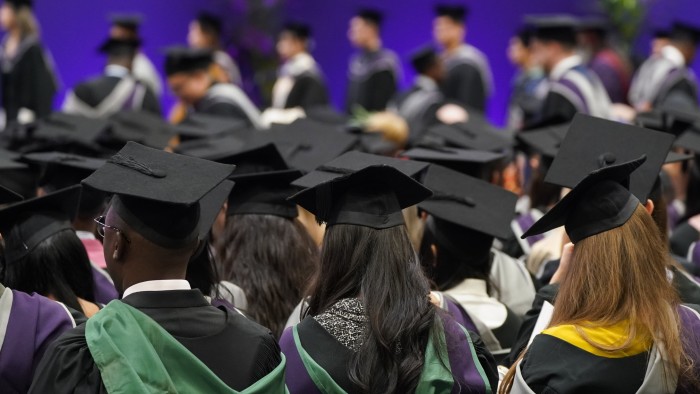Unlock the Editor’s Digest for free
Roula Khalaf, Editor of the FT, selects her favourite stories in this weekly newsletter.
UK Home Office officials have accused the Department for Education of encouraging universities to lobby against reforms to the graduate visa that are part of government efforts to cut immigration.
Home Office insiders are frustrated at the education department’s stance on its proposal to tighten the terms of the graduate visa, which allow overseas students to stay in the UK for up to two years after they finish their university degree, even if they are not working.
Under the reforms, such students would be required to find a graduate-level job to remain in the UK, people briefed on the plans said.
Home Office officials highlighted previous estimates by government advisers suggesting that a graduate salary would be above £30,000 per year.
Sir Keir Starmer is set to publish a white paper next month setting out the government’s plans to cut net migration to Britain, with changes to the graduate visa route billed as an important part.
The move is part of his effort to head off the challenge to Labour from the rightwing Reform UK party.
Home Office officials have taken the unusual step of privately accusing the education department of trying to lean on Universities UK, the main sector lobby group, to oppose the proposed changes.
“We have been tasked by the prime minister to bring down net migration and we’re trying to do that,” one Home Office official said of the plans for the migration white paper.
They added that it was really “frustrating” that the education department had “lobbied Universities UK to go out there and fight this”.
Research by the government’s Migration Advisory Committee found last year that more than 60 per cent of people on a graduate visa earned less than £30,000 after 12 months on the scheme.
Meanwhile, insiders at the education department express concern about curbs to the graduate visa route, according to people familiar with their thinking.
Vivienne Stern, chief executive of Universities UK, the sector lobby group, said it would be “madness” to cut back the route, at a time when universities were under severe financial strain.
She added that a single cohort of international students brings £40bn a year into the UK economy, adding that the two-year visa gave them time to develop professional experience and land a job.
Introduced by the Conservative government in 2021, the graduate visa route led to a rapid increase in overseas students, from fewer than 10,000 in 2020 to more than 110,000 in 2023.
The government’s proposed reforms would go beyond changes made last year by Rishi Sunak’s Tory administration, which rejected calls for a radical shake-up after warnings of serious damage to universities.
An investigation by the Migration Advisory Committee found last year that the route was not being abused, although it said rules should be tightened on some unscrupulous overseas agents mis-selling UK university courses.
Underpinning the Home Office’s attempts to limit the graduate visa route, though, are two sets of data: the first shows a high number of overseas students moving from university into low-paid work, including social care; the second suggests tens of thousands have moved from a study visa into the asylum system.
Home Office data released last month showed 40,000 asylum claims in 2024 had come from people who had held a UK visa previously. About 40 per cent of these people had a study visa.
This compares to 35,000 asylum claims being made last year by people arriving in Britain on small boats.
“We are finding people who are moving from student visas and graduate visas into asylum hotels,” said the Home Office official. “I don’t think anyone . . . would think that’s acceptable.” They added that a large proportion of those cases appeared to be “fraud”.
A government spokesperson said: “The Home Office and Department for Education are working closely to take an evidence-based approach, linking migration policy to education and skills, so immigration is no longer used at the expense of homegrown talent.
“We will always welcome international students as a key part of our world-class higher education system.”
A spokesperson for the education department said they “did not recognise” any dispute with the Home Office relating to the migration proposals.





